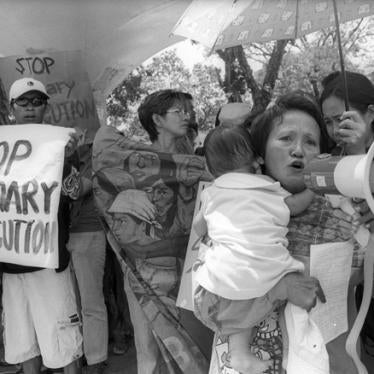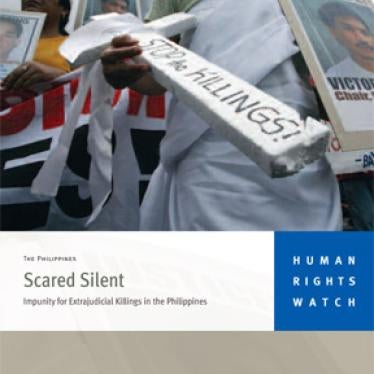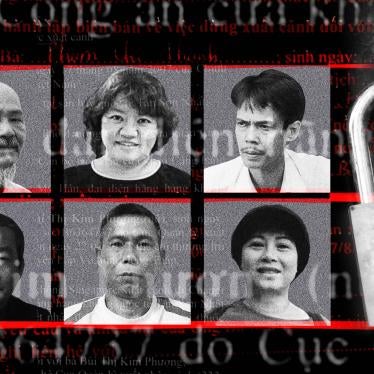(New York) - Philippine authorities should act swiftly to protect eyewitnesses to the November 2009 massacre of at least 57 people in Maguindanao province on Mindanao, and to protect their families as well, Human Rights Watch said today.
Concerns for the safety of witnesses are highlighted by the killings of two relatives of witnesses and the shooting of a third; the large number of police, military, and paramilitary personnel implicated in the massacre who remain at large; and lax security measures that allowed one suspect to escape detention, Human Rights Watch said.
"Witnesses won't come forward if there is a ‘second Maguindanao massacre' of witnesses and their families," said Elaine Pearson, deputy Asia director at Human Rights Watch. "The government needs to act quickly to protect witnesses and their relatives, and to arrest and securely detain the remaining suspects."
On November 23, 2009, in the town of Ampatuan, Maguindanao, Autonomous Region of Muslim Mindanao, dozens of gunmen stopped a convoy that was en route to file Buluan Vice Mayor Esmael "Toto" Mangudadatu's candidacy for the upcoming Maguindanao gubernatorial elections. The gunmen summarily executed at least 57 people, including Mangudadatu family members and supporters, bystanders, and more than 30 media workers.
Those charged with the killings include members of the local governing family, the Ampatuans, together with police, military, and paramilitary personnel. Andal Ampatuan Jr., mayor of Datu Unsay and son of the Maguindanao governor, Andal Ampatuan Sr., is the lead suspect in the case. He was charged on December 1, 2009; he is in custody while his bail hearing continues.
Several eyewitnesses have come forward to testify about the massacre.
On February 21, 2010, the elder brother of one suspect-turned-witness, Police Officer 1 Rainier Ebus, was shot multiple times in Datu Piang and severely wounded. According to credible sources that could not be confirmed, Ampatuan's men had offered Ebus 5 million pesos (over US$100,000) to recant his witness statement. The brother was shot after he refused to do so.
Credible sources also told Human Rights Watch that another witness was offered 25 million pesos (over US$500,000) to recant his signed witness statement. He refused. Within weeks of testifying in court, two of his family members were shot dead. The Criminal Investigation and Detection Group (CIDG) told Human Rights Watch that local police were investigating these crimes.
A member of the Ampatuan paramilitary forces told Human Rights Watch that the Ampatuans have placed a bounty on the heads of those who cooperate with investigators to testify against the Ampatuan family. He said that in late 2009, men linked to the Ampatuan family ordered him to kill one of the men involved in the massacre. The paramilitary force member said he escaped the Ampatuan fold after hearing that he was the next to be killed. He said he has learned that there is a 2 million peso (over US$40,000) bounty on his head.
Human Rights Watch urged the National Bureau of Investigation (NBI) to thoroughly and transparently investigate these killings and acts of intimidation against witnesses. To the extent that jailed Ampatuan family members are implicated, the NBI should investigate the Philippine authorities responsible for their custody.
The Justice Department, on February 9, filed charges against 197 people for 57 counts of murder on February 9, 2010. Arrest warrants have yet to be issued due to judicial delays, though some of those implicated are in custody charged with other crimes.
Of the 197 charged, 63 are police officers. Forty-nine of these police officers are under "restrictive custody"; the remaining 14 are "absent without leave." A Criminal Investigation and Detection Group spokesperson told Human Rights Watch that firearms are confiscated from police officers under restrictive custody and the officers are largely restricted to the police camp, though they can leave under guard. They remain on active duty and can be assigned administrative tasks.
Human Rights Watch questioned the effectiveness of this custody status since at least one police suspect, Anwar Masukat, escaped restrictive custody in late December or early January, reportedly swore an affidavit recanting his witness statement, and is now missing. Masukat had initially provided a signed statement implicating Ampatuan Jr. as the leader of the Maguindanao massacre. In his new statement, he pointed instead to another police witness as the massacre's mastermind. The Investigation Group spokesperson told Human Rights Watch that Masukat escaped restrictive custody while en route from Camp Crame, in Manila, to his unit in Maguindanao.
The threat to witnesses is highlighted by the government's lax detention of a suspect in custody, Human Rights Watch said. Retired Police Superintendent Piang Adam, the former Maguindanao provincial police director, escaped from the Sultan Kudarat Provincial Jail in Tacurong City between February 16 and 17. The Sultan Kudarat provincial police director, Senior Superintendent Suharto Teng Tocao, is a relative of Adam, and his jail guard, Taha Kadalum, was his cousin and has since been charged in relation to the escape.
Following this escape, the Philippine police chief, Director General Jesus Verzosa, ordered tighter security on all jail facilities and noted the need for a review of security systems and procedures. Human Rights Watch called on Interior Secretary Ronaldo Puno to carry out an urgent review of the detention arrangements of all those implicated in the Maguindanao massacre and publicly report on the findings and measures taken.
Human Rights Watch stressed the need for stronger witness protection measures to ensure, in keeping with President Gloria Macapagal-Arroyo's statement of November 25, 2009, that "the perpetrators [of the Maguindanao massacre] will not escape justice."
The United Nations special envoy on extrajudicial executions, Philip Alston, recommended in 2007 that the government ensure protection for persons who testify in killings for as long as they are at risk, and that they be provided housing and other assistance to ensure their security and well-being. Human Rights Watch made similar recommendations in its 2007 and 2009 reports about extrajudicial killings. None of these recommendations have been implemented.
Human Rights Watch called on the Arroyo administration to provide sufficient funding to ensure adequate protection for witnesses and their families, and urged the government to promptly investigate acts of witness intimidation and killing, and to ensure that the perpetrators are brought to justice. Security forces and the Justice Department should take the measures needed to protect their physical safety, including relocation where necessary, and ensure that witnesses and their families are afforded appropriate housing. Witnesses who are themselves implicated in the killings should be appropriately - and safely - detained prior to trial.
Human Rights Watch also urged the Philippine Congress to increase significantly the penalties for intimidating or assaulting a witness. Currently, intimidating a witness incurs a fine of not more than 3,000 pesos (US$65) or imprisonment of six months to one year, or both. Offenses against intimidating witnesses should also be expanded to include offenses against their relatives.
"President Arroyo has a long way to go to live up to her promise that the perpetrators of the Maguindanao massacre do not escape justice," Pearson said. "The legacy of her administration will depend in great measure on the outcome of this horrific case."








